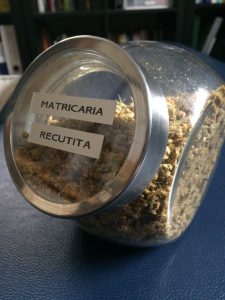 Chamomile (Matricaria recutita) is a very commonly consumed herb in today’s society, typically in tea form. What many people do not realize is this tea can be consumed for more than just socialization aspects, but also for its medicinal effects.
Chamomile (Matricaria recutita) is a very commonly consumed herb in today’s society, typically in tea form. What many people do not realize is this tea can be consumed for more than just socialization aspects, but also for its medicinal effects.
Medicinal Effects:
- Anti-oxidant
- Anti-microbial
- Anti-inflammatory
- Anti-diarrheal
- Anti-carcinogen
- Hepatoprotective
- Anti-diabetic
- Anxiolytic
- Anti-spasmodic
- Anti-emetic
- Sedative
- Carminative
Conditions Aided by this Tea
- Anxiety
- Generalized Anxiety Disorder
- Depression
- Constipation
- Diarrhea
- Dyspepsia
- Indigestion
- Insomnia
Research
Much research has been done in the area of chamomile for mental health. In particular, chamomile has been shown to be effective for generalized anxiety disorder – in particular when it is in mild or moderate states. In research, not only has chamomile tea been shown to aid with anxiety but also with anxiety combined with depression! Depression scores were rated far lower when individuals took chamomile when compared to placebo.
In addition to the research into its effects on mental health, much research has been sought into for the effects of chamomile on digestion. Chamomile has been shown to improve the duration of diarrhea (i.e. less time having diarrhea by 5 hours!), and was shown to improve colic. The anti-inflammatory nature of chamomile has also been shown to be beneficial in ulcers of the digestive tract and inflammation in the gut overall.
Finally, much research extends into chamomile being used topically (as a lotion, essential oil, or balm) for such conditions as osteoarthritis, mucositis induced by chemotherapy, and ulcers. It has been shown to be useful in decreasing inflammation in the area and improving wound healing.
Conclusions
Overall, one can argue that chamomile is more than just another tea, but rather has some potent health effects. I would encourage you to consult your health care provider to verify if regular chamomile consumption is right for you.
Have you benefited from reading this blog? Know someone that would benefit as well? Share, Like, Comment, or Tweet this article, and let me know what you think.
Some of the information provided above may not be appropriate for everyone, please consult with your doctor before trying any of the above. If you are interested in Naturopathic Medicine and wanting a different approach to your health care needs, contact Dr. Elisha Cook ND by calling 519-537-7058 and book your appointment today!
References:
https://www.ncbi.nlm.nih.gov/pmc/articles/PMC3600408/
https://www.ncbi.nlm.nih.gov/pmc/articles/PMC5074766/
https://www.ncbi.nlm.nih.gov/pmc/articles/PMC3600416/
http://longwoodherbal.org/chamomile/chamomile.pdf


